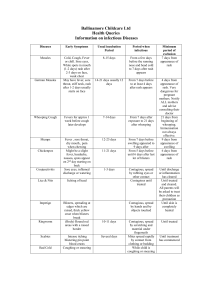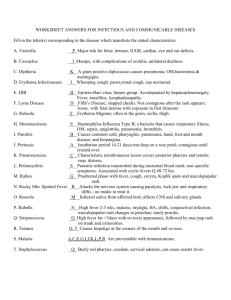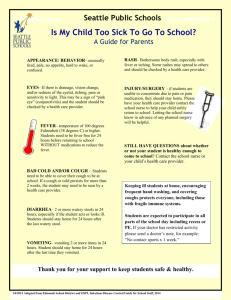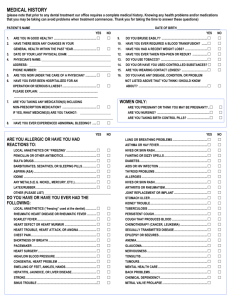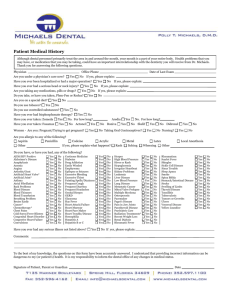Childhood Illnesses/Diseases
advertisement
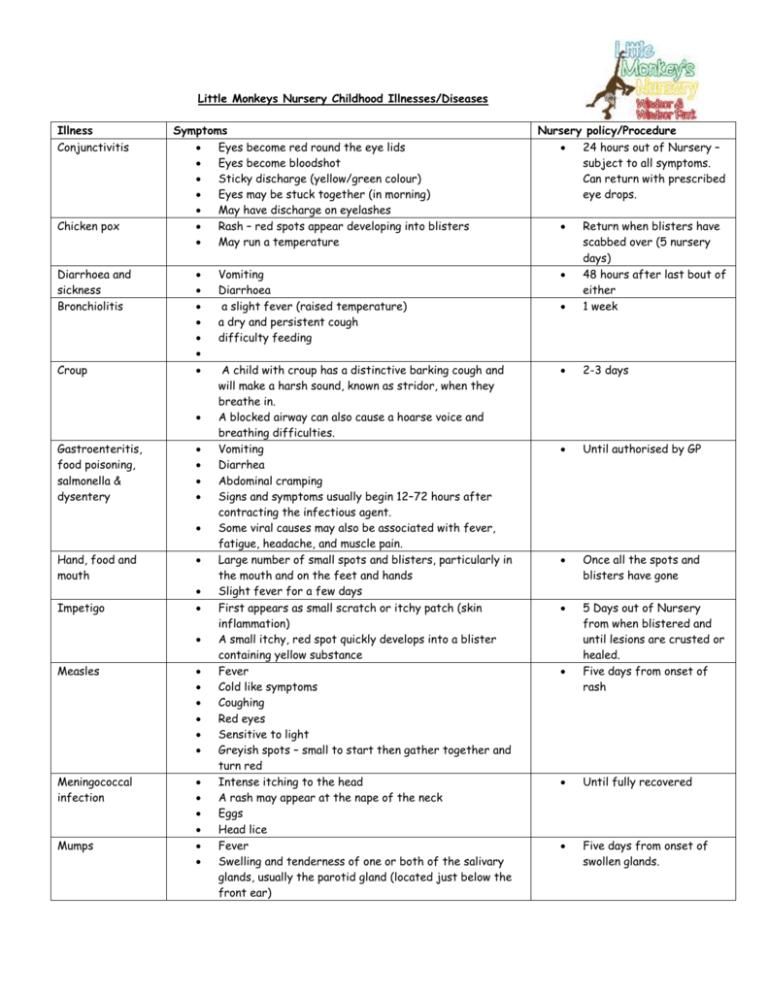
Little Monkeys Nursery Childhood Illnesses/Diseases Illness Conjunctivitis Chicken pox Diarrhoea and sickness Bronchiolitis Croup Symptoms Eyes become red round the eye lids Eyes become bloodshot Sticky discharge (yellow/green colour) Eyes may be stuck together (in morning) May have discharge on eyelashes Rash – red spots appear developing into blisters May run a temperature Gastroenteritis, food poisoning, salmonella & dysentery Hand, food and mouth Impetigo Measles Meningococcal infection Mumps Nursery policy/Procedure 24 hours out of Nursery – subject to all symptoms. Can return with prescribed eye drops. Vomiting Diarrhoea a slight fever (raised temperature) a dry and persistent cough difficulty feeding Return when blisters have scabbed over (5 nursery days) 48 hours after last bout of either 1 week A child with croup has a distinctive barking cough and will make a harsh sound, known as stridor, when they breathe in. A blocked airway can also cause a hoarse voice and breathing difficulties. Vomiting Diarrhea Abdominal cramping Signs and symptoms usually begin 12–72 hours after contracting the infectious agent. Some viral causes may also be associated with fever, fatigue, headache, and muscle pain. Large number of small spots and blisters, particularly in the mouth and on the feet and hands Slight fever for a few days First appears as small scratch or itchy patch (skin inflammation) A small itchy, red spot quickly develops into a blister containing yellow substance Fever Cold like symptoms Coughing Red eyes Sensitive to light Greyish spots – small to start then gather together and turn red Intense itching to the head A rash may appear at the nape of the neck Eggs Head lice Fever Swelling and tenderness of one or both of the salivary glands, usually the parotid gland (located just below the front ear) 2-3 days Until authorised by GP Once all the spots and blisters have gone 5 Days out of Nursery from when blistered and until lesions are crusted or healed. Five days from onset of rash Until fully recovered Five days from onset of swollen glands. Meningitis Pediculosis (lice) Pertussis (whooping cough) Please note that not everyone will develop symptoms below and that they can appear in any order Fever Vomiting Refusal to eat High pitched or moaning cry Irritability May also develop a tense or bulging fontanelle Blotchy or pale skin Rapid breathing Floppy body Stiffness with jerky movements Intense itching to the head A rash may appear at the nape of the neck Rubella (German measles) Ringworm of scalp Ringworm of body Scabies Scarlet fever and streptococcal infection of throat Shingles Dependant on the case – to be discussed with Linsey or Derry-Ann/Nicole Once treatment has been administered 24 hours out of Nursery 21 days from onset of paroxysmal cough The condition usually begins with a persistent dry and irritating cough that progresses to intense bouts of coughing. These are followed by a distinctive 'whooping' noise, which is how the condition gets its name. Other symptoms include a runny nose, raised temperature and vomiting after coughing. Slight fever Swollen lymph nodes at the back of the neck and behind the ears. A non-itchy rash that develops on the second or third of illness. Small patches of scaly skin on the scalp, which may be sore Patchy hair loss Itchy scalp Small, pus-filled sores on the scalp Crusting on the scalp A ring like red rash on the skin- skin will look red and irritated around the ring but healthy on the inside Intense itching to the head A rash may appear at the nape of the neck Eggs Head lice Slight to moderate fever Sore throat Rash which is often located in their armpits/groin Skin can peel and they get a coarse pink tongue (known as strawberry tongue) Usually affects a specific area on either the left or right side of the body and does not cross over the midline of the body. It causes a painful rash which develops into itchy blisters. Most people will feel unwell for several days before the rash appears. Five days from onset of rash. Until cured Once treatment has been administered 24 hours out of nursery Excluded until treatment is complete, usually 24 hours. 5 days from commencing antibiotic treatment. Can return to nursery once all lesions have dried, and formed a crust. Slapped check Threadworm Tonsillitis Tuberculosis Reddening of the cheeks which fades and reoccurs The face rash is followed by a lace like rash on the trunk and limbs which may be worse in sunlight or after a hot bath The incubation period is 4 – 20days until rash develops. Unless a child is obviously unwell, there is no need for exclusion from nursery after the onset of the rash. Itchy feeling round the anus (usually at night under warm sheets Sore throat High temperature Coughing Headache Symptoms usually pass after 3-4 days and children are contagious during this time. Having a persistent cough for more than three weeks that brings up phlegm, which may be bloody weight loss night sweats high temperature (fever) tiredness and fatigue loss of appetite 24 hours after treatment has been administered Depending on the seriousness of the case – returning to nursery must be discussed with Linsey or Derry-Ann/Nicole Until declared free from infection by doctor. Please note: If your child experiences any of the listed illnesses or diseases outside of the nursery e.g. whilst on holiday or at the weekend, you MUST still report it into the nursery as we will need to notify the other families of children who attend the setting and any expectant mothers. Signed:………………………………………………………………… Date reviewed 31st January 2013 7th March 2013 15th April 2013 22nd April 2013 Date:………………………………… Changes made No changes 5 days out of nursery to reduce risk of spreading – chicken pox Added tonsillitis, ringworm & slapped cheek syndrome Added scabies By whom Derry-Ann Gray Nicole Halls Sheree Hardiman Derry-Ann Gray
